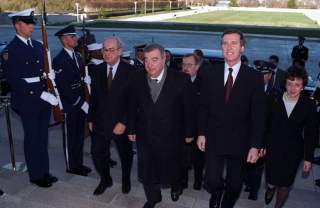How Yevgeny Primakov's Legacy Lives On
The Ufa 2015 summit is a testament to the late Yevgeny Primakov's lasting geopolitical vision.
Amidst the headlines blaring the Supreme Court's landmark ruling on gay marriage and the breaking-news coverage of the coordinated ISIS attacks on three continents, the death of Yevgeny M. Primakov understandably slipped through the cracks. Nevertheless, it is important to take a moment to assess his pivotal role in the reshaping of geopolitics in the twenty-first century.
The summit meetings that will be held in the Russian city of Ufa on July 8-9, 2015, between the two emerging organizations channeling the rising power of the non-Western world—the Shanghai Cooperation Organization and the Brazil-Russia-India-China-South Africa (BRICS) forum—are the sprouts of the seeds that Primakov helped to plant in the 1990s. As foreign minister and then as prime minister of Russia in the second Yeltsin administration, Primakov played a major role in reorienting his country's trajectory away from Atlanticism towards what he termed a multipolar approach—one that was premised on the idea that Russia's interests as a great power (and particularly its freedom of action) would be better served by forming a counterbalance to the Euro-American world and particularly its efforts to codify international rules and regulations.
The Russian elite defines a “great power” as a country that does not have to accept the agenda that is defined by others. The initial Atlanticist push westward under Boris Yeltsin's first foreign minister, Andrei Kozyrev, was guided by the hope that Russia would be admitted to the councils of the Western world with real opportunities to shape the agenda—and by shaping the agenda, this was understood not to simply mean a presence at meetings (like the G-8), but the ability to alter U.S. and EU behavior when it touched on matters of importance to Russia or Russian clients.
Primakov believed that Russia could get itself a better deal if it more closely aligned itself with the rising powers who would also be interested in revising elements of the Western order in their favor. Greater coordination among the key non-Western powers would strengthen their bargaining position, especially vis-a-vis Washington. Primakov thus pushed for a new strategic opening to both Beijing and New Delhi, calling for the formation of a Russia-India-China process as a loose association to balance Western predominance in global affairs.
Like the proverbial turtle in its race with the hare, Primakov never pushed for development of this triangle too quickly by jumping the gun in suggesting a binding military alliance. At first, it was merely a series of meetings to share information and search for coordinated positions at international fora like the United Nations. Primakov counted on India and China to suffer their own perceived slights and setbacks with the West, which would strengthen the potential appeal of non-Western coordinated action.
At the same time, Primakov pushed Russia along the path of reconciliation with the Chinese to settle lingering border disputes that had nearly brought Moscow and Beijing to war in 1969, inaugurating the Shanghai process with China and other former Soviet republics. What all of these processes did was begin to habituate the various nations to greater cooperation and coordination. More importantly, these initiatives were not tied up with Primakov as an individual or even with the Yeltsin administration, so after he was relieved of his duties as prime minister, what he had initiated continued to gain momentum. The Shanghai process for border delineation gave birth to the Shanghai Cooperation Organization, and the informal coordination of Russian, Indian and Chinese foreign ministers gradually become more institutionalized and began to take on new members. Today, the BRICS forum is a reality in world politics and is acquiring the building blocks of a defined international organization—including the development of a bank.
Moreover, these new relationships have been critical in blunting the impact of Western sanctions imposed on Russia for its actions in Ukraine. In fact, because the United States in particular has been unable to breech the solidarity of non-Western powers with Moscow to get them to join in efforts to isolate Russia, the Kremlin has been able to hold its position and demonstrate the validity of Primakov's approach. Indeed, as the center of global economic dynamism shifts to the Asia-Pacific, Primakov's vision of Russia sitting at the heart of a greater Eurasian integration takes on new life. Despite political pressure not to attend, the presence of a number of Western CEOs at this year's St. Petersburg Economic Forum testified to their concerns not to lose their foothold in Russia (even if they were hesitant in moving ahead with new, major investments), as the new Silk Road to the east increasingly moves from being a marketing slogan into a concrete reality.
Primakov did not live to see the Ufa summit. The massive gathering of non-Western leaders as summit participants and observers, however, serves as a memorial to his geopolitical vision—and to the challenge it poses to the West's ability to continue to guide the world's development along liberal lines.
Nikolas Gvosdev, a professor of national security studies and a contributing editor at The National Interest, is co-author of Russian Foreign Policy: Vectors, Sectors and Interests (CQ Press, 2013). The views expressed here are his own.
Image: Wikimedia/R.D. Ward

